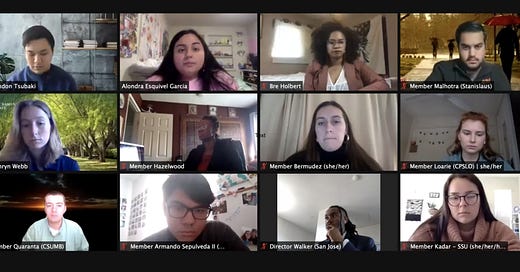Cal State Student Association to recognize stolen land at CSU campuses
The CSSA’s Systemwide Affairs Committee discusses campus police reform during its virtual meeting Saturday morning.
This story, for republication or reference, was originally written by Julia Terbeche of the Daily 49er.
During its virtual meeting Saturday, the Cal State Student Association discussed ways to move forward with addressing stolen Indigenous land across California State University campuses.
CSSA’s Systemwide Affairs Committee will be looking at establishing an acknowledgement plan for the CSU system and the association to recognize stolen land. To continue advocating for Indigenous communities, board members suggested that campuses continue discussion and collaboration with local Native groups.
“We thought it would be appropriate to get some input on the committee and what their campuses have done to recognize stolen indigenous land they are on,” said Alondra Esquivel Garcia, vice president of systemwide affairs.
Board members offered suggestions by stating practices that have been implemented at their campuses, such as including a line in their email signatures, making a statement of recognition during campus events and holding an Indigenous People’s Day.
During public comment, several students voiced their support for reforming university police systemwide, including “disarming and demilitarizing” campus officers.
Many participants expressed their disapproval of how every University Police Department officer is armed with an AR15-type rifle, a weapon they deemed “a source of tragedy in our nation.”
Long Beach State’s campus police officers carry “Colt AR-15 model A3, M4, SBR COMMANDO 5.56mm or similar design and caliber” as a patrol rifle, according to UPD policy.
“Campus police as an institution is a racist institution,” said Faith Garcia, a student from San Marcos. “We do not want, nor are we asking for, more police officers, we want more money to go to programs that students need.”
Several speakers asked that funds be reallocated to resources for students who are food or housing insecure and to increase mental health support.
In response, Guan Liu, vice president of legislative affairs, confirmed that CSSA is “committed to securing $15 million in ongoing funds for mental health and technology needs.” President Zahraa Khuraibet said CSSA will establish a task force to address reforming campus police.
“We have to do our due diligence in reaching out to different community developers, and I think it’s important that we start within our own governing members in seeing how the people within the different communities feel, so please listen to them first,” Khuraibet said.
Liu mentioned that members should consider becoming involved as campus safety officers and create a “systemwide perspective that we’re positively impacting all CSU students.”
“I think it’s so important that we hear various perspectives, obviously we’re dealing with a very sensitive issue,” Liu said. “Having fellow students participate in the process of engaging in ensuring our campus community is safe is, I think, a good thing.”
Giovanni Guerrero, board member from Humboldt State, maintained that the resolution to reform campus police must be “palatable and achievable,” and must accurately reflect all stakeholders and the system as a whole.
“If it doesn’t seem like [the resolution] is going far enough, it isn’t because we don’t want it to go that far, it’s because we want to address all the concerns of each 23 CSU campus while also implementing the needed changes and reforms,” Guerrero said.
Melissa Kadar, board member from Sonoma State, voiced concerns over the CSU system’s distribution of student fees, stating that fees designed for mental health support are not properly disbursed to these services.
While existing student fees go toward funding mental health support, there are no fees created to solely fund Counseling and Psychological Services, she said. Kadar feels that money should be redistributed so mental health fees are distributed only to CAPS.
“The CAPS fee, the collection of that on each campus, for example at Sonoma, it’s not all going towards mental health services,” Liu said. “Some of that fee is going towards the EO 1000, which are being used for other campus services.”
The board decided to conduct more research on the issue and move toward bringing it to the attention of the Chancellor’s Office.




